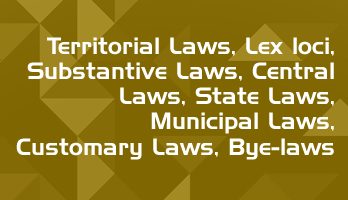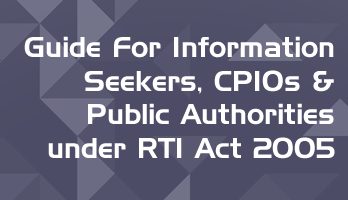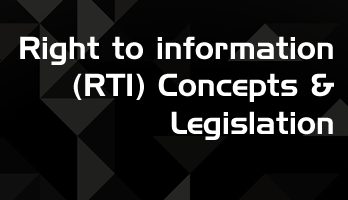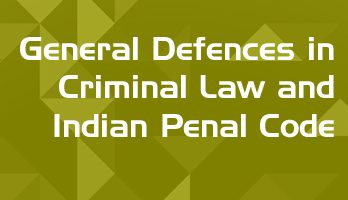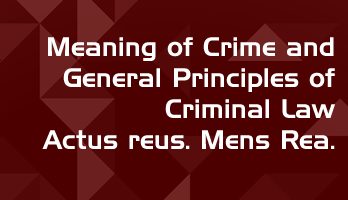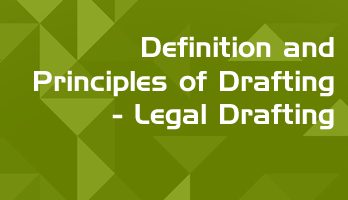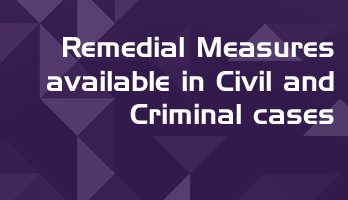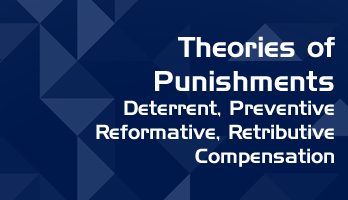Free Full Course Available on LawMint's YouTube Channel
How to Land Your Dream LLB Internship in a Top Law Firm
- Part 1 - Introduction
- Part 2 - Internship Planning
- Part 3 - Internship Research
- Part 4 - Building Your Profile
- Part 5 - The Email
- Part 6 - The Resume
- Part 7 - The Cover Letter
- Part 8 - The Interview
- Part 9 - Self Development
Practical and comprehensive course, with real examples and step-by-step analysis of the complete internship application process. Check out LawMint's YouTube channel now!
Rule of Fair Hearing
The Rule simply implies that a person must be given an opportunity to defend himself/herself. This principle is a ‘sine qua non’ of every civilized society. Corollary deduced from this rule is “qui aliquid statuerit, parte inaudita altera aeuquum licet dixerit, haud aequum facerit” (he who shall decide anything without the other side having been heard although he may have said what is right will not have done what is right).
The same principle was expressed by Lord Hewart when he said, “It is not merely of some importance, but is of fundamental importance that justice should not only be done, but should manifestly and undoubtedly be seem to be done’’.
Administrative difficulty in giving notice and hearing to a person cannot provide any justification for depriving the person of opportunity of being heard. Furthermore, observance of the rules of natural justice has no relevance to the fatness of the stake but is essentially related to the demands of a given situation.
Even if the legislature specifically authorizes an administrative action without hearing, except in cases of recognized exceptions, then the law would be violative of the principles of fair hearing as per Articles – 14 and 21 of the Indian Constitution. However, refusal to participate in inquiry without valid reason cannot be pleaded as violation of natural justice at a later stage.
Right to Notice
‘Notice’ is the starting point of any hearing. Unless a person knows the formulation of subjects and issues involved in the case, he/she cannot defend himself/herself. It is not enough that the notice in a case be given, but it must be adequate also. The adequacy of notice is a relative term and must be decided with reference to each case.
But generally, a notice in order to be adequate must contain the following:
- The test of adequacy of ‘Notice’ will be whether it gives sufficient information and material so as to enable the person concerned to put up an effective defence. Therefore, the contents of notice, persons who are entitled to ‘Notice’ and the time of giving ‘Notice’ are important matters to ascertain any violation of the principles of natural justice.
- Sufficient time should also be given to comply with the requirement of notice. Thus, when only 24 hours were given to demolish a structure alleged in a dilapidated condition; the Court held that notice is not proper. In the same manner where notice contained only one charge, the person cannot be punished for any other charge for which notice was not given.
However, the requirement of notice will not be insisted upon as a mere technical formality, when the concerned party clearly knows the case against him and is not thereby prejudiced in any manner in putting up an effective defence.
Right to Present Case and Evidence
The adjudicatory authority should afford reasonable opportunity to the party to present his/her case. This can be done through writing or orally at the discretion of the authority unless the statute under which the authority is functioning directs otherwise.
The requirements of natural justice are met only if opportunity to represent is given in view of the proposed action. The demands of natural justice are not met even if the very person proceeded against has been furnished information on which the action is based, if it is furnished in a casual way or for some other purposes.
This does not mean that the opportunity need be a “double opportunity”, that is, one opportunity on the factual allegations and another on the proposed penalty. But both may be rolled into one.
The Courts are unanimous on the point that oral hearing is not an integral part of fair hearing unless the circumstances are so exceptional that without oral hearing a person cannot put up an effective defence. Therefore, where complex legal and technical questions are involved or where stakes are very high oral hearing shall become a part of fair hearing.
Thus, in the absence of a statutory requirement for oral hearing courts will decide the matter taking into consideration the facts and circumstances of every case.
The Right to Rebut Adverse Evidence
The right to rebut adverse evidence presupposes that the person has been informed about the evidence against him. This does not, however, necessitate the supply of adverse material in original in all cases. It is sufficient if the summary of the contents of the adverse material in made available provided it is not misleading.
The opportunity to rebut evidence necessarily involves the consideration of two factors:
- cross-examination and
- legal representation.
Cross-Examination
‘Cross-examination’ is the most powerful weapon to elicit and establish truth. However, the Courts do not insist on ‘cross-examination’ in administrative adjudication unless the circumstances are such that in the absence of it the person cannot put up an effective defence.
Where the witnesses have orally deposed, the refusal to allow cross-examination would certainly amount to violation of the principles of natural justice. In the area of labour relations and disciplinary proceedings against civil servants also, the right to cross-examination is included in the rule of fair hearing.
Legal Representation
Normally representation through a lawyer in any administrative proceeding is not considered an indispensable part of the rule of natural justice as oral hearing is not included in the meaning of fair hearing.
This denial of legal representation is justified on the ground that lawyers tend to complicate matters, prolong the proceedings and destroy the essential informality of the proceedings. It is further justified on the ground that the representation through a lawyer of choice would give edge to the rich over the poor who cannot afford a good lawyer.
The fact remains that unless some kind of a legal aid is provided by the agency itself, the denial of legal representation, to use the words of Professor Allen, would be a ‘mistaken kindness’ to the poor people.
To what extent legal representation would be allowed in administrative proceedings depends on the provisions of the Statute. Factory Laws do not permit legal representation, Industrial Dispute Acts allows it with the per-mission of the Tribunal and some Statutes like Income Tax Act permit legal representation as a matter of right.
However, the Courts in India have held that in situations where the person is illiterate, or the matter is complicated and technical, or expert evidence is on record or a question of law is involved, or the person is facing a trained prosecutor, some professional assistance must be given to the party to make his right to defend himself meaningful.
Report of the Inquiry to be shown to the Other Party
In many cases, especially in matters relating to disciplinary proceedings, it happens that to conduct the inquiry, the action is entrusted to someone else and on the basis of the report of the inquiry the action is taken by the competent authority.
Under these circumstances a very natural question arises is that whether the copy of the report of the inquiry officer be supplied to the charged employee before final decision is taken by the competent authority? This question is important both from the constitutional and administrative law point of view.
One of the cardinal principles of the administrative law is that any action which has civil consequences for any person cannot be taken without complying with the principles of natural justice. Therefore, administrative law question in disciplinary matter has always been whether failure to supply the copy of the Report of the Inquiry to the delinquent employee before final decision is taken by the competent authority would violate the principles of natural justice?
In the same manner the constitutional question in such a situation will be whether failure to supply the copy of the Report of the Inquiry to the delinquent would violate the provisions of Article – 311(2) of the Constitution of India?
Article – 311(2) of the Constitution provides that no government employee can be dismissed or removed or reduced in rank without giving him/her a reasonable opportunity of being heard in respect of charges framed against him/her.
Therefore, it has always been a perplexing question whether failure to supply the report of the inquiry officer to the charged government employee before final decision is taken would amount to failure to provide “reasonable opportunity” as required under Article 311(2).
Another Constitutional question that can be asked in such a situation would be whether any final action taken by the authority on the basis of the report of the inquiry without first supplying the copy of it to the delinquent would be arbitrary and hence violative of Article – 14 of the Constitution which enshrines the great harmonizing and rationalizing principle?
The findings on the merit recorded by the Inquiry Officer are intended merely to supply appropriate material for the consideration of the government. Neither the findings nor the recommendations are binding on the Disciplinary Authority.
The Inquiry Report along with the evidence recorded by the inquiry officer constitute the material on which the government has ultimately to act. That is the only purpose of the inquiry and the report which the inquiry officer makes as a result thereof.
The application of the principles of natural justice varies from case to case depending upon the factual aspect of the matter. For example, in the matters relating to major punishment, the requirement is very strict and full-fledged opportunity is envisaged under the statutory rules before a person is dismissed removed or reduced in rank, but where it relates to only minor punishment, a mere explanation submitted by the delinquent officer concerned meets the requirement of principles of natural justice.
In some matters oral hearing may be necessary but in others, It may not be necessary.
Post Decisional Hearing
‘Pre-Decisional Hearing’ is the standard norm of rule of audi alteram partem. But ‘Post-Decisional Hearing’ affords an opportunity to the aggrieved person to be heard. However, ‘post-decisional hearing’ should be an exception rather than being the rule itself. It is acceptable in the following situations:
- where the original decision does not cause any prejudice or detriment to the person affected;
- where there is urgent need for prompt action; and
- where it is impracticable to afford pre-decisional hearing.
The idea of ‘Post-Decisional Hearing’ has been developed to maintain a balance between administrative efficiency and fairness to the individual. This harmonizing tool was developed by the Supreme Court in ‘Maneka Gandhi v. Union of India’.
In this case on 1st June, 1976 the passport of the petitioner, a journalist, was impounded in public interest by an order of the Government without furnishing any reasons therefore. The petitioner, being aggrieved by such arbitrary action of the government filed a petition before the Supreme Court under Article-32 challenging the validity of the impoundment order.
One of the contentions of the government was that the rule of audi alterm partem must be held to be excluded because it may frustrate the very purpose of impounding the passport.
Rejecting the contention, the court rightly held that though the impoundment of the passport is an administrative action yet the rule of fair hearing is attracted by necessary implication and it would not be fair to exclude the application of this cardinal rule on the ground of administrative convenience.
Though the court had not quashed the order outrightly but has developed the technique of ‘Post-Decisional Hearing’ in order to balance such situations to provide a fair opportunity of being heard immediately after serving the order impounding the passport; which would satisfy the mandate of natural justice.
Questions
Define ‘Rule of Fair Hearing’.
‘Rule of Fair Hearing’ simply implies that a person must be given an opportunity to defend himself/herself.
Discuss the main components of a ‘Valid Notice’.
The important components of a Notice are:
1. Time, place and nature of hearing.
2. Legal authority under which hearing is to be held.
3. Statement of specific charges which the person has to meet.
Free Full Course Available on LawMint's YouTube Channel
How to Land Your Dream LLB Internship in a Top Law Firm
- Part 1 - Introduction
- Part 2 - Internship Planning
- Part 3 - Internship Research
- Part 4 - Building Your Profile
- Part 5 - The Email
- Part 6 - The Resume
- Part 7 - The Cover Letter
- Part 8 - The Interview
- Part 9 - Self Development
Practical and comprehensive course, with real examples and step-by-step analysis of the complete internship application process. Check out LawMint's YouTube channel now!
Acknowledgement : This article is adapted from Swayam-NIOS course material.



